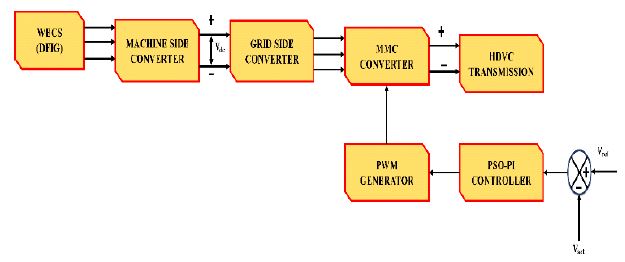Comprehensive Analysis of Recent developments of control strategies and Modular Multilevel Converter for HVDC
DOI:
https://doi.org/10.5281/zenodo.11280078Keywords:
wind energy conversion system (wecs), high voltage direct current (hvdc), modular multilevel converter (mmc), particle swarm optimization (pso), doubly-fed induction generator (dfig)Abstract
The growing need for Renewable Energy Sources (RESs) has made Wind Energy Conversion Systems (WECS)—that is, systems that use Modular Multilevel Converters (MMC) and Doubly Fed Induction Generators (DFIG)—essential components of modern power generation. Although these systems have advantages including enhanced grid integration and variable-speed operation, complex control techniques are required to realize their full potential. This requirement is acknowledged in the proposed study, which also presents proportional-integral (PI) and particle swarm optimization (PSO) controllers as essential components of an advanced control system. Optimizing WECS performance is the major goal, with a focus on achieving and sustaining a steady DC link voltage. In order to ensure overall system reliability and efficiency, DC link voltage stability is crucial, especially when using High-Voltage Direct Current (HVDC) technology to transmit electrical power across long distances. The MATLAB Simulink platform is employed to demonstrate the efficacy of the suggested work.
Downloads
References
Tiwari, R., & Babu, N. R. (2016). Recent developments of control strategies for wind energy conversion system. Renewable and Sustainable Energy Reviews, 66, 268-285.
Al Talaq, M., & Al-Muhaini, M. (2024). Optimal coordination of time delay overcurrent relays for power systems with integrated renewable energy sources. in Power System Protection in Future Smart Grids, pp. 81-107. Academic Press.
Abid, M. S., Ahshan, R., Al Abri, R., Al-Badi, A., & Albadi, M. (2023). Multi-objective optimal planning of virtual synchronous generators in microgrids with integrated renewable energy sources. IEEE Access.
Hamid, B., Hussain, I., Iqbal, S. J., Singh, B., Das, S., & Kumar, N. (2022). Optimal MPPT and BES control for grid-tied DFIG-based wind energy conversion system. IEEE Transactions on Industry Applications, 58(6), 7966-7977.
Ma, Y., Tao, L., Zhou, X., & Shi, X. (2020). Analysis and control of fault ride-through capability improvement for wind energy conversion system using linear active disturbance rejection control with correction link. IEEE Access, 8, 73816-73827.
Jabbour, N., Tsioumas, E., Mademlis, C., & Solomin, E. (2020). A highly effective fault-ride-through strategy for a wind energy conversion system with a doubly fed induction generator. IEEE Transactions on Power Electronics, 35(8), 8154-8164.
Rao, Y. T., Chakraborty, C., & Sengupta, S. (2020). Performance and stability of brushless induction excited synchronous generator operating in self-excited mode for wind energy conversion system. IEEE Transactions on Energy Conversion, 36(2), 919-929.
Puchalapalli, S., Singh, B., Tiwari, S. K., & Goel, P. K. (2020). Design and analysis of grid-interactive DFIG based WECS for regulated power flow. IEEE Transactions on Industry Applications, 56(5), 5396-5407.
Lin, C. H., & Wu, Y. K. (2021). Overview of frequency-control technologies for a VSC-HVDC-integrated wind farm. IEEE Access, 9, 112893-112921.
Zhang, J., Li, K. J., Sun, K., Liu, W., & Liu, Z. (2020, October). Dynamic reactive droop control strategy for the MMC-HVDC system integrating the suburban wind farms into the urban power grid. in IEEE Industry Applications Society Annual Meeting, pp. 1-7. IEEE.
Mosaad, M. I., Ramadan, H. S. M., Aljohani, M., El-Naggar, M. F., & Ghoneim, S. S. (2021). Near-optimal PI controllers of STATCOM for efficient hybrid renewable power system. IEEE Access, 9, 34119-34130.
Sharma, S., & Tayal, V. K. (2022). Optimised controller design for frequency control of a wind turbine driven doubly fed induction generator. International Journal of Ambient Energy, 43(1), 7197-7206.
Hamdan, I., MM Youssef, M., & Noureldeen, O. (2023). A review of intelligent control systems for grid tie doubly fed induction generator based wind farm. SVU-International Journal of Engineering Sciences and Applications, 4(2), 269-278.
Chhipą, A. A., Chakrabarti, P., Bolshev, V., Chakrabarti, T., Samarin, G., Vasilyev, A. N., ... & Kudryavtsev, A. (2022). Modeling and control strategy of wind energy conversion system with grid-connected doubly-fed induction generator. Energies, 15(18), 6694.
Hossain, M. I., Shafiullah, M., Al-Sulaiman, F. A., & Abido, M. A. (2022). Comprehensive analysis of PV and wind energy integration into MMC-HVDC transmission network. Sustainability, 15(1), 253.
Bekakra, Y., & Attous, D. B. (2014). Optimal tuning of PI controller using PSO optimization for indirect power control for DFIG based wind turbine with MPPT. International Journal of System Assurance Engineering and Management, 5, 219-229.

Downloads
Published
How to Cite
Issue
Section
ARK
License
Copyright (c) 2024 Patra Gowtami, Dr. J. Ramakant

This work is licensed under a Creative Commons Attribution 4.0 International License.
Research Articles in 'Applied Science and Engineering Journal for Advanced Research' are Open Access articles published under the Creative Commons CC BY License Creative Commons Attribution 4.0 International License http://creativecommons.org/licenses/by/4.0/. This license allows you to share – copy and redistribute the material in any medium or format. Adapt – remix, transform, and build upon the material for any purpose, even commercially.










